同等学力英语语法专项复习虚拟语气
(完整版)英语虚拟语气语法归纳总结
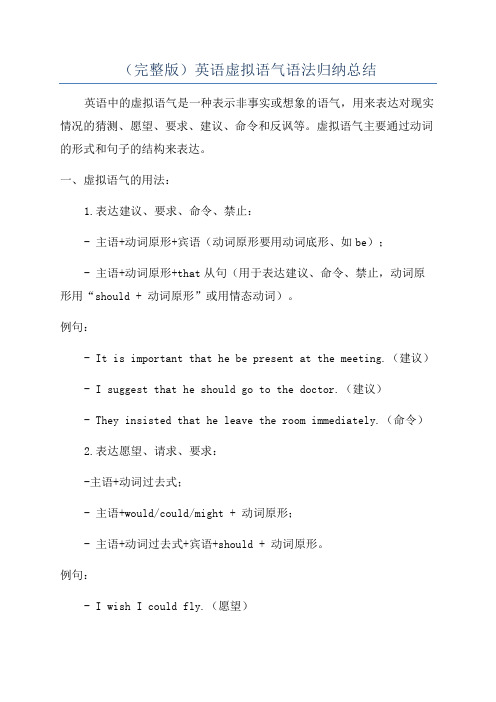
(完整版)英语虚拟语气语法归纳总结英语中的虚拟语气是一种表示非事实或想象的语气,用来表达对现实情况的猜测、愿望、要求、建议、命令和反讽等。
虚拟语气主要通过动词的形式和句子的结构来表达。
一、虚拟语气的用法:1.表达建议、要求、命令、禁止:- 主语+动词原形+宾语(动词原形要用动词底形、如be);- 主语+动词原形+that从句(用于表达建议、命令、禁止,动词原形用“should + 动词原形”或用情态动词)。
例句:- It is important that he be present at the meeting.(建议)- I suggest that he should go to the doctor.(建议)- They insisted that he leave the room immediately.(命令)2.表达愿望、请求、要求:-主语+动词过去式;- 主语+would/could/might + 动词原形;- 主语+动词过去式+宾语+should + 动词原形。
例句:- I wish I could fly.(愿望)- I would appreciate it if you could help me.(请求)3.表示虚拟条件:- If条件从句中的谓语动词用过去完成时,主句用would/should/might/could + have + 过去分词;- If条件从句中的谓语动词用过去时,主句用would/should/could + 动词原形。
例句:- If I had known his phone number, I would have called him.(虚拟条件)- If you had listened to me, we could have finished the project earlier.(虚拟条件)4.表达建议、要求、祝愿:- If only内部称述 + 主语 + 过去式。
英语语法之虚拟语气
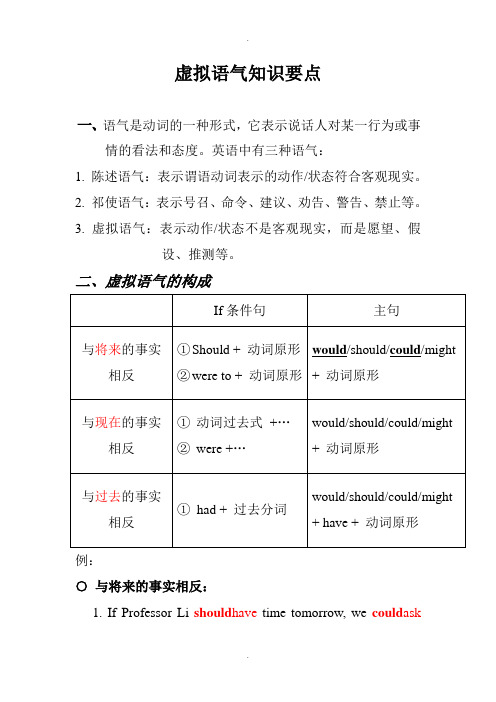
虚拟语气知识要点一、语气是动词的一种形式,它表示说话人对某一行为或事情的看法和态度。
英语中有三种语气:1.陈述语气:表示谓语动词表示的动作/状态符合客观现实。
2.祁使语气:表示号召、命令、建议、劝告、警告、禁止等。
3. 虚拟语气:表示动作/状态不是客观现实,而是愿望、假设、推测等。
二、虚拟语气的构成例:○与将来的事实相反:1.If Professor Li should have time tomorrow, we could askhim some questions.2.If there should be no air, there would be no living things.3.If it wereto snow tomorrow, they couldn’t goout.○与现在的事实相反:1. If it rained now, I wouldnotgo shopping.2. If I were a teacher, I wouldbe strict with my students.3. If it werenot for their help, we shouldbe in a very difficultposition.○与过去的事实相反:1. If I hade yesterday, I wouldhaveseen him.2. If we hadstarted earlier, we shouldnothavemissed thetrain.3. If she hadn’tbeen ill, she mighthavee.***请注意三种特殊情况:○上面的句子大多都可以改成倒装句,这时If就省略了,同学们要能识别出来。
如:1. Should there be no air, there wouldbe no living things.2. Were it not for their help, we shouldbe in a very difficultposition.3. Had she not been ill, she mighthavee.○错综时间条件句。
英语语法 虚拟语气的知识点归纳
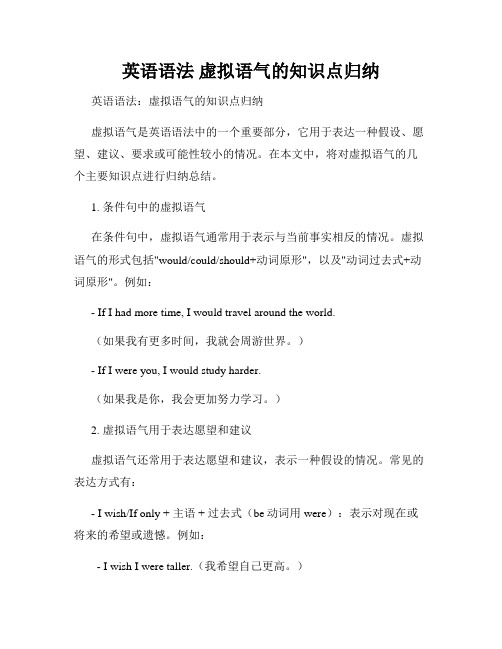
英语语法虚拟语气的知识点归纳英语语法:虚拟语气的知识点归纳虚拟语气是英语语法中的一个重要部分,它用于表达一种假设、愿望、建议、要求或可能性较小的情况。
在本文中,将对虚拟语气的几个主要知识点进行归纳总结。
1. 条件句中的虚拟语气在条件句中,虚拟语气通常用于表示与当前事实相反的情况。
虚拟语气的形式包括"would/could/should+动词原形",以及"动词过去式+动词原形"。
例如:- If I had more time, I would travel around the world.(如果我有更多时间,我就会周游世界。
)- If I were you, I would study harder.(如果我是你,我会更加努力学习。
)2. 虚拟语气用于表达愿望和建议虚拟语气还常用于表达愿望和建议,表示一种假设的情况。
常见的表达方式有:- I wish/If only + 主语 + 过去式(be动词用were):表示对现在或将来的希望或遗憾。
例如:- I wish I were taller.(我希望自己更高。
)- If only she could speak fluent English.(要是她能说一口流利的英语就好了。
)- It is time + 主语 + 过去式(should + 动词原形):用于表示现在或将来应该发生的动作。
例如:- It is time we started the meeting.(是时候开始会议了。
)- It is time you should apologize to her.(你应该向她道歉了。
)3. 虚拟语气在宾语从句中的使用在宾语从句中,若主句的动词表达了建议、命令、要求等含义时,宾语从句中的谓语动词常使用虚拟语气。
具体的用法如下:- 建议:suggest/recommend + (that) + 主语 + (should)+ 动词原形。
初中英语知识点归纳虚拟语气总结

初中英语知识点归纳虚拟语气总结虚拟语气(Subjunctive Mood)在英语语法中是一个相当重要的概念,在初中英语学习中也是一个需要重点掌握的知识点。
本文将对初中英语中涉及到的虚拟语气进行归纳总结,旨在帮助学生更好地理解虚拟语气的用法和意义。
一、虚拟语气的定义虚拟语气是一种用来表示说话人所描述的动作、状态或假定情况在现实中并没有发生的语气。
虚拟语气常用于表示愿望、建议、要求、命令、条件、假设等情况,它与现实情况相对应。
二、虚拟语气的主要用法1. 表示愿望与建议虚拟语气常用于表示愿望与建议,通常使用这些句型:1) I wish/If only + 过去式:表示对现在或将来的情况表示遗憾、希望是不可能实现的。
例如:I wish I were taller.(我希望我更高。
)If only it would stop raining.(要是天停止下雨就好了。
)2) It's time/ high time + 过去式:表示某个动作应该发生,但实际上尚未发生。
例如:It's time you went to bed.(现在该是你上床睡觉的时候了。
)It's high time we started our homework.(我们开始做家庭作业的时间已经到了。
)3) Should + 动词原形:表示建议。
例如:You should take a break.(你应该休息一下。
)2. 表示条件与假设虚拟语气常用于表示条件与假设,常见的虚拟语气句型包括:1) If + 主语 + 过去式,主语 + would/could + 动词原形:表示对现在或未来的假设条件。
例如:If I had a car, I would drive to work.(如果我有一辆车,我会开车去上班。
)2) Were + 主语:在虚拟条件句中,表示与现在事实相反或不可能实现的情况。
例如:If I were you, I would study harder.(如果我是你,我会更加努力学习。
英语语法——虚拟语气
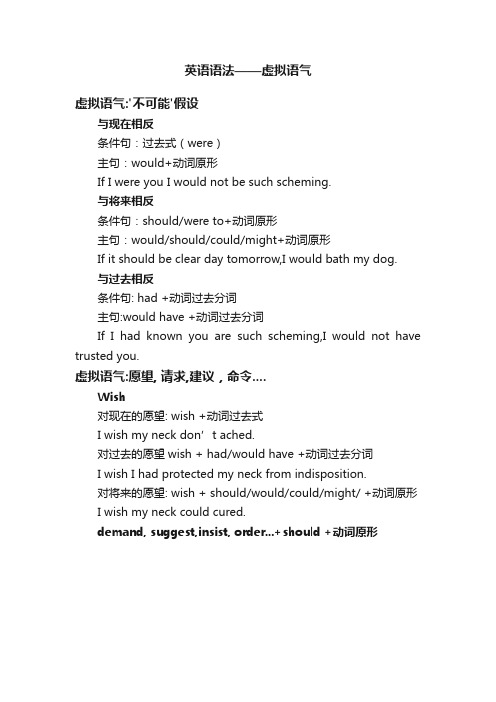
英语语法——虚拟语气
虚拟语气:'不可能'假设
与现在相反
条件句:过去式(were)
主句:would+动词原形
If I were you I would not be such scheming.
与将来相反
条件句:should/were to+动词原形
主句:would/should/could/might+动词原形
If it should be clear day tomorrow,I would bath my dog.
与过去相反
条件句: had +动词过去分词
主句:would have +动词过去分词
If I had known you are such scheming,I would not have trusted you.
虚拟语气:愿望, 请求,建议,命令....
Wish
对现在的愿望: wish +动词过去式
I wish my neck don’t ached.
对过去的愿望wish + had/would have +动词过去分词
I wish I had protected my neck from indisposition.
对将来的愿望: wish + should/would/could/might/ +动词原形
I wish my neck could cured.
demand, suggest,insist, order...+should +动词原形。
英语《虚拟语气》语法知识总结归纳
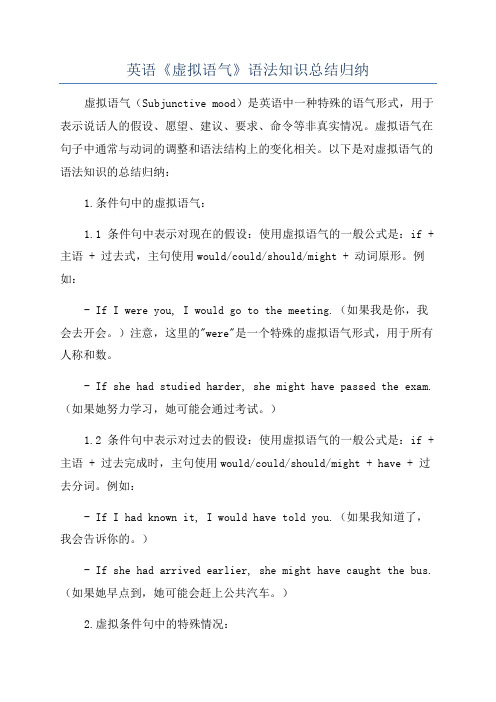
英语《虚拟语气》语法知识总结归纳虚拟语气(Subjunctive mood)是英语中一种特殊的语气形式,用于表示说话人的假设、愿望、建议、要求、命令等非真实情况。
虚拟语气在句子中通常与动词的调整和语法结构上的变化相关。
以下是对虚拟语气的语法知识的总结归纳:1.条件句中的虚拟语气:1.1 条件句中表示对现在的假设:使用虚拟语气的一般公式是:if + 主语 + 过去式,主句使用would/could/should/might + 动词原形。
例如:- If I were you, I would go to the meeting.(如果我是你,我会去开会。
)注意,这里的"were"是一个特殊的虚拟语气形式,用于所有人称和数。
- If she had studied harder, she might have passed the exam.(如果她努力学习,她可能会通过考试。
)1.2 条件句中表示对过去的假设:使用虚拟语气的一般公式是:if + 主语 + 过去完成时,主句使用would/could/should/might + have + 过去分词。
例如:- If I had known it, I would have told you.(如果我知道了,我会告诉你的。
)- If she had arrived earlier, she might have caught the bus.(如果她早点到,她可能会赶上公共汽车。
)2.虚拟条件句中的特殊情况:2.1 在虚拟条件句中表示命令、建议时,主句中的动词可以使用动词原形(而不是would/could/should/might + 动词原形)。
例如:- If you have any questions, please let me know.(如果你有任何问题,请告诉我。
)- If I were you, I would take a break.(如果我是你,我会休息一下。
高中英语知识点归纳虚拟语气的用法及常见表达方式

高中英语知识点归纳虚拟语气的用法及常见表达方式虚拟语气在高中英语中是一个重要的语法知识点。
它在表达与现实相反的情况、假设、建议和愿望等方面起到了重要作用。
本文将详细介绍虚拟语气的用法及常见表达方式。
一、虚拟语气的基本形式在英语中,虚拟语气的基本形式包括虚拟条件句和虚拟语气在从句中的使用。
1. 虚拟条件句虚拟条件句通常包括三个主要部分:if引导的条件从句、主句中的would/should/could/might以及从句中的动词形式(常为过去式或were)。
例如:- If I had more money, I would travel around the world.(如果我有更多的钱,我会周游世界。
)2. 虚拟语气在从句中的使用虚拟语气在从句中的使用主要是通过动词的变化形式来表达。
常见的动词形式包括:过去式、were(用于所有人称)、should/ought to。
例如:- I wish I could speak fluent French.(我希望我能说一口流利的法语。
)二、虚拟语气的用法虚拟语气在英语中的使用具有一定的规则和情境。
下面将介绍几种常见的情况。
1. 表达与现实相反的情况- If I were you, I would quit that job immediately.(如果我是你,我会立刻辞职。
)该句中,使用了“were”而不是“was”,表示与当前事实相反的情况。
2. 表达假设和想象- If I had a time machine, I would go back to the past.(如果我有时光机器,我会回到过去。
)该句中,使用了“had”而不是“have”,表示假设的情况。
3. 表达建议和命令- The teacher suggested that we should study harder for the exam.(老师建议我们应该更加努力地学习考试。
)该句中,使用了“should”来表示建议。
高中英语知识点归纳虚拟语气的用法和种类

高中英语知识点归纳虚拟语气的用法和种类虚拟语气是英语语法中的一个重要部分,它用来表达与现实事实相反、与过去事实相反、与将来事实相反和与现在事实相反的情况。
掌握虚拟语气的用法和种类对于高中英语学习者来说至关重要。
本文将对虚拟语气的用法和种类进行归纳总结。
一、与现实事实相反的虚拟语气1. 虚拟条件句虚拟条件句用来表示与现实相反的情况。
它的一般形式是:if + 主语(过去式)、主语(were) + 动词的过去分词,主语 +would/should/might/could + 动词原形。
例如:- If I were a bird, I would fly in the sky.(如果我是一只鸟,我会在天空中飞翔。
)- If he had studied harder, he would have passed the exam.(如果他学得更努力,他就会通过考试。
)2. 虚拟表达愿望或建议的句子虚拟语气在表达愿望或建议时常常被使用,常见的形式是:主语 + 过去式 + 动词原形。
例如:- I wish I had more time to travel.(我希望有更多的时间旅行。
)- She suggested that he go to the library.(她建议他去图书馆。
)二、与过去事实相反的虚拟语气1. 过去完成时的虚拟语气过去完成时的虚拟语气表示过去某个时间已经发生但实际并未发生的情况,常用的形式是:had + 动词的过去分词。
例如:- If I had known you were coming, I would have prepared a meal.(如果我知道你要来了,我会准备一顿饭的。
)- He wished he had studied harder when he was in high school.(他希望当他还在高中时学习更努力。
)2. 过去简单时的虚拟语气过去简单时的虚拟语气表示过去某个时间未发生的情况,常用的形式是:动词的过去式。
- 1、下载文档前请自行甄别文档内容的完整性,平台不提供额外的编辑、内容补充、找答案等附加服务。
- 2、"仅部分预览"的文档,不可在线预览部分如存在完整性等问题,可反馈申请退款(可完整预览的文档不适用该条件!)。
- 3、如文档侵犯您的权益,请联系客服反馈,我们会尽快为您处理(人工客服工作时间:9:00-18:30)。
2013年同等学力英语语法专项复习:虚拟语气一、总述虚拟语气(subjunctive mood )用来表示说话人的愿望、请求、意图、建议、怀疑、设想等未能或不可能成为事实的情况,以及在说话人看来实现可能性很小的情况。
由于虚拟语气是动词的一种特殊表现形式,因而动词的变化形式体现出虚拟语气所包含的不同含义。
虚拟语气用于非真实条件句时的构成如下表所述:二、重要考点1. 在非真实条件句中,有时从句的动词所表示的动作和主句的动词所表示的动作并不同时发生,这样的条件句中使用的虚拟式称为混合虚拟式。
其构成视具体情况而定。
例如:If I had taken my raincoat when I came out this morning, I would not be wet now.If I were you, I wouldn’t have missed the film last night.2. 引导非真实条件从句的连词if 在正式文体中有时可以省去, were、had、should 等非行为动词这时应提到从句句首。
例如:If I were you, I wouldn’t feel sorry.→Were I you, I wouldn’t feel sorry.3. 有些句子从表层结构上看是无if 引导的非真实条件句,但从深层意思上看if 是存在的。
这种情况下主句动词仍需用虚拟式。
这类句子中常出现without (如果没有),but for (要不是),otherwise (否则),but that (若不,后接一从句)等词或词组。
例如:But for your help, they couldn’t have succeeded.She wasn’t feeling well. Otherwise,she wouldn’t have left the meeting so early.4. 在It is + 形容词 + that 从句的句型中,that 引导的主语从句中的谓语动词采用should + 动词原形形式,其中should 常省略。
可用于此句型的形容词还有:absurd, advisable, better, best, desirable, (un)fair, fortunate, good, imperative, important, incredible, just, natural, (un) necessary, odd, pleasant, possible, preferable, right, ridiculous, sad, silly, unusual, urgent, vital, wrong 等,表示必要、应该、建议、要求、惊讶、不相信等含义。
例如:It’s necessary that we (should) set out at once.It’s proposed that a committee (should) be set up to look into the matter.5. 具有“提议、建议、请求、命令”等含义的动词所带的从句(包括宾语从句和主语从句)中,谓语动词用should + 动词原形形式。
美国英语多用动词原形,英国英语多用should + 动词原形。
有相同用法的动词还有:ask, advise, agree, arrange, beg, command, decide, demand, desire, determine, direct, instruct, insist, intend, maintain, move, order, persuade, pray, propose, recommend, request, require, stipulate, suggest, tell, urge。
如:I suggest that we (should) go camping tomorrow. He insisted that our laboratory reports (should) be handed inthe day after the experiment was done.应当注意的是,当suggest、insist 等词不再表示“建议”或“坚持要求”的含义时,其后面的从句不再用虚拟语气。
例如:His look suggested that he wasn’t telling the truth.He insisted that he was right.6. 虚拟式可用于wish 后的宾语从句中,表示与事实相反的愿望。
其表达形式一般是将谓语动词提前一个时态。
例如:I wish I had been to the concert last night.I wish he would forgive me.7. It’s (high, about) time that…的句型要求用虚拟式,表示应该做还没有做的事。
其表达形式一般是谓语动词使用过去时态。
例如:It’s high time that he stopped smoking.It’s about time that we took our leave.8. 在I would rather 后的句子中,动词也要求用虚拟式,表示某人的愿望。
其表达形式一般是将谓语动词提前一个时态。
例如:I’d rather you left tomorrow instead of today.I’d rather he hadn’t done anything like that.9. 在由as if、as though 引导的方式状语从句中,表示和现在事实相反或对现在情况有所怀疑,或表示与主句谓语动词同时或其后的假设情况时,从句中谓语动词用过去时。
表示过去想象中的动作或情况或表示在主句谓语动词所表示时间之前的假设情况,从句用过去完成时。
如果表示的情况很可能发生或是事实,则用陈述语气。
例如:She looks as if she knew all about it.They talked as though they had got acquainted with each other for years.10. 在if only 引起的感叹句中,用谓语动词的一般过去时表示与现在的事实相反的情况,用过去完成时表示与过去事实相反的情况。
例如:If only he knew our telephone number!11. 在lest、for fear that 、in case 等词引导的从句中,谓语动词用should + 动词原形表示虚拟,should 一词也可以省略。
例如:Grown people should never say or do anything wrong before children, lest they (should) set them a bad example.三、例题1. If you ______ that late movie last night, you wouldn’t be dozy ( 困倦的) now.A. haven’t watchedB. didn’t watchC. hadn’t watchedD. wouldn’t have watched2. Had I known it, I ______ you.A. have toldB. and toldC. wouldn’t be toldD. would have told3. ______ the storm, we should have reached our destination.A. For butB. But forC. In spite ofD. In case of4. She insisted that what she had done ______ right.A. wasB. isC. beD. had been5. I wish you ______ me yesterday.A. tellB. could tellC. would tellD. had told6. ______ it left to me to decide, I would not hesitate to prefer the latter.A. IfB. WereC. HadD. Should7. It is important that you ______ to the dean before leaving for you vacation.A. speakB. spokenC. haveD. speaks8. It’s about time people ______ notice of what women did during the war.A. tookB. takeC. have takenD. will take9. He talks as if he ______ the incident.A. had witnessedB. witnessedC. witnessD. have witnessed10. The boss asked that the letter ______ immediately.A. be typedB. typedC. witnessD. being typed11. Don’t you think it is time that you ______ smoking?A. give upB. would give upC. gave upD. must give up12. Without computer, we ______ the tremendous medical advancement in the last few decades.A. would not makeB. will not have madeC. could not makeD. couldn’t have made13. ______ for your laziness, you could have finished the assignment by now.A. Had it not beenB. Weren’t itC. It were notD. Had not it been14. I’d have come with you ______ I am so busy.A. except forB. provided thatC. but thatD. so long as15. It is strange that such a thing ______ in your company.A. will happenB. happensC. happenedD. should happen16. It’s essential that these application forms ______ back as early as possible.A. must be sentB. will be sentC. are sentD. be sent17. We move that he ______ for his serious mistake.A. will be dischargedB. be dischargedC. is dischargedD. must be discharged18. It was arranged that they ______ the following week.A. leaveB. must leaveC. will leaveD. shall leave19. He made the suggestion that a deadline ______ for handing in the plan.A. be setB. must be setC. is setD. will be set20. I wish I ______ to see the film last night.A. wentB. will goC. should goD. had gone21. The manager would rather his daughter ______ in the same office.A. hadn’t workedB. not to workC. doesn’t workD. didn’t work22. He feels as if he alone ______ responsible for the traffic accident.A. should beB. isC. wereD. would be23. It’s about time that we ______ our old concept.A. changedB. would changeC. will changeD. shall change24. ______, he wouldn’t have left.A. If he wasn’t given the cold shoulderB. If he had not been given the cold shoulderC. If he were to be given the cold shoulderD. If he should given the cold shoulder25. ______, he would be rich now.A. If he were to take my adviceB. If he took my adviceC. Had he taken my adviceD. Should she take my advice26. But for his help, I ______.A. wouldn’t have passed the driving testB. wouldn’t pass the driving testC. didn’t pass the driving testD. won’t pass the driving test27. I don’t know his address; ______.A. otherwise I will write to himB. otherwise I would write to himC. otherwise I had written to himD. otherwise I would have written to him四、例题解析1. 答案:C解析:此题考混合虚拟式。
